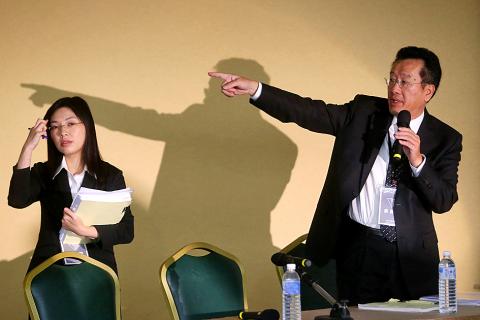The Ill-gotten Party Assets Settlement Committee yesterday consulted historians and former officials at the China Youth Corps at a hearing in Taipei to determine whether the corps is a Chinese Nationalist Party (KMT) affiliate, but questions surrounding the foundation’s operations remained.
The committee’s investigation report found that the corps — known as the China Youth Anti-Communist National Salvation Corps until 2000 — was founded in 1952 after a resolution by the then-KMT Central Reform Committee in an effort to “depose Chinese communists and resist Soviet Union forces” following the KMT’s defeat in the Chinese Civil War and its retreat to Taiwan.
It organized camps to teach combat skills to young people at high-school level and above under the control of the Ministry of National Defense until 1969, when then-president Chiang Kai-shek’s (蔣介石) son, then-minister of national defense Chiang Ching-kuo (蔣經國), took over as premier, the committee said.

Photo: CNA
The budgets granted to the corps by central government agencies were received by the then-KMT Central Committee (now the KMT Central Standing Committee), which distributed the money to the corps, it said.
The corps later underwent a transformation and started organizing a variety of activities — including art classes, hiking and camping groups, and school graduation trips — and was designated a social organization overseen by the Executive Yuan, the committee said.
In 1989, it was registered as a private foundation, it said.
Asked by committee Chairman Wellington Koo (顧立雄) why the then-KMT Central Committee had received the money on behalf of the corps, corps deputy chief executive Cheng Fei-wen (鄭斐文) said he did not know.
Koo asked Chinese Cultural University history professor Tung Pao-cheng (董保城) whether the corps’ “instantaneous” transition from a government agency to a social organization, and later to a foundation, ran counter to social justice, since all its resources came from the central government.
Tung replied that during the Martial Law era, people were banned from forming groups and so the corps was monitored by the Executive Yuan.
After the Civil Associations Act (人民團體法) was passed in 1989, the corps was promptly registered as a foundation because it met all the qualifications, Tung said.
Koo asked former corps secretariat director Chao Ling-cheng (趙令正) why a number of members have doubled as presidents of education and cultural firms and foundations established by the corps.
Saying that the then-KMT government required all people aged between 16 and 25 to join the corps, he asked Chao why the corps’ size has shrunk to just 100 members.
Chao could not answer either question, saying the issues were not within his purview.
Former Academia Historica secretary-general Chen Li-wen (陳立文) said that she did not know whether the corps had returned the capital granted to it by the central government, but, as far as she knew, the corps used the majority of its funds on its work and organizing youth activities.
Koo said in an interview during an afternoon break that although information on how the corps acquired its funds was insufficient, the issue should not be dropped just because the corps was formed during the party-state era.
The committee is to focus its efforts to trace the cash flow to the corps between 1952 and 1969 by requesting more data from the Ministry of National Defense, he said.

SECURITY: As China is ‘reshaping’ Hong Kong’s population, Taiwan must raise the eligibility threshold for applications from Hong Kongers, Chiu Chui-cheng said When Hong Kong and Macau citizens apply for residency in Taiwan, it would be under a new category that includes a “national security observation period,” Mainland Affairs Council (MAC) Minister Chiu Chui-cheng (邱垂正) said yesterday. President William Lai (賴清德) on March 13 announced 17 strategies to counter China’s aggression toward Taiwan, including incorporating national security considerations into the review process for residency applications from Hong Kong and Macau citizens. The situation in Hong Kong is constantly changing, Chiu said to media yesterday on the sidelines of the Taipei Technology Run hosted by the Taipei Neihu Technology Park Development Association. With

CARROT AND STICK: While unrelenting in its military threats, China attracted nearly 40,000 Taiwanese to over 400 business events last year Nearly 40,000 Taiwanese last year joined industry events in China, such as conferences and trade fairs, supported by the Chinese government, a study showed yesterday, as Beijing ramps up a charm offensive toward Taipei alongside military pressure. China has long taken a carrot-and-stick approach to Taiwan, threatening it with the prospect of military action while reaching out to those it believes are amenable to Beijing’s point of view. Taiwanese security officials are wary of what they see as Beijing’s influence campaigns to sway public opinion after Taipei and Beijing gradually resumed travel links halted by the COVID-19 pandemic, but the scale of

A US Marine Corps regiment equipped with Naval Strike Missiles (NSM) is set to participate in the upcoming Balikatan 25 exercise in the Luzon Strait, marking the system’s first-ever deployment in the Philippines. US and Philippine officials have separately confirmed that the Navy Marine Expeditionary Ship Interdiction System (NMESIS) — the mobile launch platform for the Naval Strike Missile — would take part in the joint exercise. The missiles are being deployed to “a strategic first island chain chokepoint” in the waters between Taiwan proper and the Philippines, US-based Naval News reported. “The Luzon Strait and Bashi Channel represent a critical access

Pope Francis is be laid to rest on Saturday after lying in state for three days in St Peter’s Basilica, where the faithful are expected to flock to pay their respects to history’s first Latin American pontiff. The cardinals met yesterday in the Vatican’s synod hall to chart the next steps before a conclave begins to choose Francis’ successor, as condolences poured in from around the world. According to current norms, the conclave must begin between May 5 and 10. The cardinals set the funeral for Saturday at 10am in St Peter’s Square, to be celebrated by the dean of the College